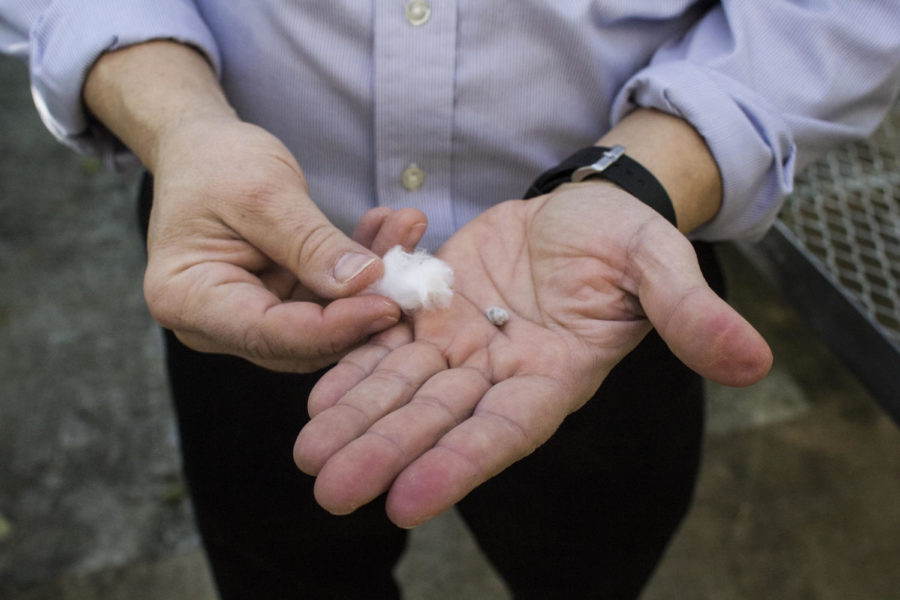New class requires beginning school earlier in year
Kelby Wingert/Iowa State Daily
Robert Wallace, associate professor in ecology, evolution and organismal biology, pulls apart the fibers from a cotton seed in the greenhouse on the roof of Bessey Hall.
March 11, 2017
A new class is requiring agronomy students to give up part of their summer. While it might sound like a bummer, they are looking forward to it.
Dubbed Agronomy 279, the new class is one sophomores majoring in Agronomy will have to take to graduate. The class will meet for the first time during the fall 2017 semester.
The catch? Their first class will be Aug. 7, according to the agronomy department.
The addition came after the agronomy department said it decided to redesign the curriculum. Agronomy 279 will be an application of material students learned in Agronomy 181 and 182. Students will go outside in the fields to learn about soil and crops.
“Students really like hands-on activities,” Erik Christian, lecturer in agronomy, said. “Students do a lot of training in the summer when they go work on their internships and that’s going to be out in the field. [Currently], we don’t offer them those experiences.”
The agronomy department decided to have students come to campus two weeks early based on a seasonal timeframe. This timeframe is when it is still warm enough outside to observe crops.
“This is something we can get done much more effectively if we have [students] for a couple hours a day,” Amber Anderson, lecturer in agronomy, said. “It’s a matter of getting those activities in when the plants are actually available, before the soil’s frozen, before frost kills off the plants.”
The department hopes that the in-person experience will be a better approach to teaching concepts rather than teaching in a classroom from a textbook.
“I learn significantly better if I can see it, I can touch it, I can smell it,” Anderson said. “I believe that knowledge will be cemented in a way you cannot do in a classroom.”
Because of these experiences, Anderson thinks students will stand out from the crowd when they apply for future internships and jobs.
Some students have internships during the summer that they believe will help them with the class.
“The main thing they look for is experience,” Andrew Blomme, sophomore in agronomy, said. “They look for any experience with agronomic concepts or field work. I think that makes a person more appealing to employers.”
Students will have to pay $200 in additional fees. These fees will go toward renting the facilities at the field sites and transportation fees, according to the agronomy department.
During the two weeks before classes officially start, students will be out in the field for four hours. As it stands, there will be two sections, one in the morning and one in the afternoon, Christian said.
Christian and Anderson said that there are a lot of things that still need to be determined, including where the students will live during the two weeks. Finding a place to live for two weeks can be a challenge for students, and the agronomy department is trying to help them.
“We want this to be a positive experience,” Christian said. “We want this to be as low impact from a stress and worry standpoint as possible. Financially too.”
While some students have off-campus apartments or houses, others will have to work with the Department of Residence to move into a residence hall or on-campus apartments early.
The DOR said it doesn’t have anything set in stone, but Christian said there will likely be an option for students to help out with “Move-In Crew.”
Each August, students volunteer to help fellow students move into the residence halls. The people who help are allowed to move into their room early at no charge. Normally students who move in early have to pay $50 a day until the regularly scheduled move in day, according to the Department of Residence.
Christian said that if students agree to help, the amount of money students have to pay to arrive on campus early could reduce.
But money is another problem. Some students have to leave their summer jobs, hindering their income to be able to pay fees. Despite this, Christian said he thinks the class will be worth their time.
After the two weeks, the class will meet in a traditional classroom setting, but students will take the final for the class earlier in the semester, Kendall Lamkey, agronomy department chair, said.
While it was shocking for some to learn that they had to come to campus early, most are eager to apply what they learned in their freshman classes to an actual field setting.
“[Coming to campus early] caught me off guard,” Blomme said. “I hope it brings concepts we learn in the classrooms all together. I hope it helps us become better decision-makers.”







